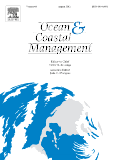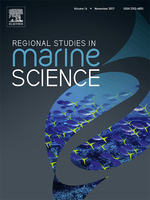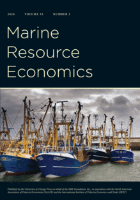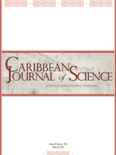
OCEAN & COASTAL MANAGEMENT
Scope & Guideline
Navigating the Future of Coastal Sustainability
Introduction
Aims and Scopes
- Integrated Coastal Zone Management (ICZM):
Research on strategies and practices for managing coastal zones that consider ecological, social, and economic factors to promote sustainable development. - Marine Spatial Planning (MSP):
Studies exploring the planning and regulation of marine spaces to balance ecological health with human activities such as fishing, shipping, and tourism. - Climate Change Adaptation and Mitigation:
Investigations into the impacts of climate change on coastal systems and strategies for enhancing resilience among communities and ecosystems. - Ecosystem Services and Biodiversity Conservation:
Research focusing on the valuation of ecosystem services provided by marine and coastal environments and approaches to conserve biodiversity. - Sustainable Fisheries Management:
Studies addressing the challenges of fisheries management, including stock assessment, bycatch reduction, and the socio-economic dimensions of fisheries. - Pollution and Environmental Management:
Research on the sources, impacts, and management of marine pollution, including plastics, nutrients, and hazardous materials. - Socio-Economic Aspects of Coastal Management:
Explorations of the socio-economic dimensions affecting coastal communities, including governance, stakeholder engagement, and community resilience. - Innovative Technologies in Marine Management:
Research on the application of new technologies such as remote sensing, GIS, and artificial intelligence in managing marine and coastal resources.
Trending and Emerging
- Climate Resilience and Adaptation Strategies:
There is a growing focus on developing and assessing climate adaptation strategies for coastal communities, emphasizing resilience-building measures in response to sea-level rise and extreme weather events. - Nature-Based Solutions (NbS):
Research on the use of natural systems for coastal protection and restoration is on the rise, showcasing the effectiveness of mangroves, wetlands, and other ecosystems in mitigating climate impacts. - Marine Conservation and Biodiversity Protection:
Emerging studies emphasize the importance of marine protected areas and conservation initiatives aimed at preserving marine biodiversity amidst increasing anthropogenic pressures. - Digital Tools and Data Analytics in Marine Management:
The integration of digital technologies, including GIS, remote sensing, and machine learning, is increasingly prevalent in studies aimed at enhancing the management of marine resources and environmental monitoring. - Public Participation and Stakeholder Engagement:
Research focusing on the role of local communities and stakeholders in coastal management is gaining traction, highlighting the importance of inclusive governance for effective resource management. - Plastic Pollution and Marine Debris Management:
There is a significant uptick in studies addressing the sources, impacts, and mitigation strategies for plastic pollution in marine environments, reflecting global urgency in tackling this issue. - Cumulative Impact Assessments:
Emerging methodologies for assessing cumulative environmental impacts from various stressors are being prioritized, emphasizing the need for holistic approaches to coastal and marine management.
Declining or Waning
- Traditional Fisheries Practices:
Research on conventional fishing methods and their socio-economic impacts has decreased, possibly due to a shift towards sustainable practices and technology-driven fisheries management. - Marine Oil and Gas Exploration:
Studies focused on the impacts of oil and gas extraction activities in marine environments have become less frequent, likely due to increasing concerns over environmental impacts and a global shift towards renewable energy. - Coastal Engineering Solutions:
Research centered on hard engineering approaches for coastal protection, such as sea walls and groins, has waned in favor of nature-based solutions that emphasize ecological restoration and resilience. - Historical Coastal Management Practices:
There appears to be a decline in studies examining historical coastal management practices, as the focus shifts towards innovative and adaptive management strategies in response to contemporary challenges. - Pollution from Shipping Activities:
Although still relevant, specific studies on pollution from shipping have decreased, potentially overshadowed by broader discussions on marine litter and plastic pollution.
Similar Journals

Anthropocene Coasts
Navigating the Challenges of the Anthropocene CoastlineAnthropocene Coasts is a pivotal peer-reviewed journal published by SpringerNature, dedicated to advancing the interdisciplinary understanding of coastal systems in the context of the Anthropocene epoch. Since its inception in 2018, the journal has focused on critical issues at the intersection of Nature and Landscape Conservation, Ocean Engineering, Oceanography, and Waste Management and Disposal, achieving an impressive Q2 ranking in all these categories as of 2023. With a country of origin in Canada, this journal not only addresses significant environmental challenges, but also promotes innovative solutions and sustainable practices that resonate globally. Researchers, professionals, and students engaged in marine science, environmental studies, and engineering will find valuable insights and cutting-edge research disseminated through this open-access platform. By fostering collaboration and knowledge-sharing, Anthropocene Coasts empowers its audience to contribute to the sustainable management of coastal environments in an era of rapid change.

JOURNAL OF COASTAL CONSERVATION
Exploring sustainable strategies for oceanic health and biodiversity.JOURNAL OF COASTAL CONSERVATION, published by SPRINGER, is a premier academic journal dedicated to the study and promotion of coastal ecosystem management and conservation strategies. With a rich publication history beginning in 1995 and spanning over multiple converged years, this journal serves as a vital platform for researchers and professionals in the fields of Ecology, Nature and Landscape Conservation, and Oceanography. Recognized for its impactful contributions, it holds a Q2 ranking in multiple categories for 2023, including Ecology and Oceanography, underscoring its significance in advancing knowledge and practice in coastal conservation. With a commitment to delivering high-quality, peer-reviewed articles, the journal facilitates discourse on critical issues affecting coastal environments, making it an essential resource for scholars and practitioners looking to enhance the sustainability and resilience of coastal habitats. The journal provides broad access to vital research findings, ensuring that both the academic community and policy-makers have the information necessary to address the pressing challenges facing coastal regions worldwide.

Regional Studies in Marine Science
Pioneering Insights into Oceanic InteractionsRegional Studies in Marine Science, published by Elsevier, is a leading academic journal dedicated to advancing the understanding of marine ecosystems and their regional dynamics since its inception in 2015. With an ISSN of 2352-4855, this journal is indexed in Scopus and has achieved impressive ranking quartiles, notably Q2 in categories like Animal Science and Zoology, and Ecology, showcasing its relevance and impact in these fields. As of 2023, it ranks in the 79th percentile for Animal Science and Zoology, reflecting its significant contribution to academic discourse. While the journal operates under a traditional access model, its rigorous peer-review process ensures the publication of high-quality research that is crucial for understanding ecological interactions and fostering sustainable practices within marine environments. Researchers, professionals, and students alike will find this journal an invaluable resource for the latest findings and advancements in marine science, as it strives to bridge the gap between research and practical application at regional and global levels.

Marine Resource Economics
Exploring Sustainable Solutions for Marine ResourcesMarine Resource Economics is a premier journal published by University of Chicago Press, dedicated to the intersection of marine resource management and economics. With an ISSN of 0738-1360 and an E-ISSN of 2334-5985, this journal has established itself as an influential platform for scholarly discourse since its inception, covering comprehensive research from 1987 and persistently evolving up to 2024. It holds a commendable position in the 2023 category quartiles, ranking Q2 across various disciplines such as Economics and Econometrics, Geography, Planning and Development, Management, Monitoring, Policy and Law, and Oceanography. The journal's robust impact is further highlighted by its impressive Scopus rankings, boasting a 74th percentile in Geography and Planning, and a 67th percentile in Oceanography, among others. Although it operates under a subscription model, Marine Resource Economics is invaluable for researchers, professionals, and students interested in sustainable management practices and the socioeconomic aspects of marine resources, offering insights that inform policy and strategic decision-making in this critical field.

Ocean and Coastal Research
Fostering interdisciplinary insights for ocean conservation.Ocean and Coastal Research, published by the Institute Oceanográfico of the University of São Paulo, is an essential academic journal dedicated to advancing the fields of Aquatic Science, Oceanography, and Water Science and Technology. Established in 2020, the journal has quickly become a noteworthy platform contributing to the understanding and sustainable management of marine and coastal ecosystems, with an open access model that promotes the dissemination of critical research findings. Although currently categorized in the fourth quartile across its respective fields in 2023, the journal serves as an emerging repository of valuable insights for researchers, professionals, and students alike, aiming to make impactful discoveries that address contemporary challenges in ocean conservation and resource management. The journal's editorial team is committed to fostering interdisciplinary collaboration and upholding rigorous peer-review standards, thereby ensuring high-quality contributions that reflect the dynamic nature of marine science. With an E-ISSN of 2675-2824, all access to published articles is freely available, supporting global research efforts addressing crucial environmental issues.

Indian Journal of Geo-Marine Sciences
Fostering Collaboration in Geo-Marine SciencesThe Indian Journal of Geo-Marine Sciences, published by the NATIONAL INSTITUTE OF SCIENCE COMMUNICATION & INFORMATICS (NISCAIR), serves as a vital platform dedicated to the dissemination and advancement of knowledge in the field of marine and geosciences. As an open-access journal, it allows for improved visibility and accessibility of research findings to a global audience, enabling researchers, professionals, and students to share insights into oceanography and related disciplines. With a publication history spanning from 2007 to 2010 and continuing from 2012 to 2024, it has established itself within the academic community as a reliable source of innovative research, despite being classified in Q4 of Oceanography and holding a Scopus rank that places it in the 27th percentile. This journal is particularly relevant for those investigating marine ecosystems, geological oceanography, and their interconnections, thus playing an essential role in fostering understanding and communication within this important area of scientific inquiry.

OCEAN DYNAMICS
Transforming Understanding of Oceanic PhenomenaOCEAN DYNAMICS is a premier peer-reviewed journal published by Springer Heidelberg, dedicated to advancing the field of oceanography. With an ISSN of 1616-7341 and an E-ISSN of 1616-7228, the journal has established itself as a key resource for researchers and professionals interested in the dynamic processes of the world's oceans. As of 2023, it holds an impressive Q2 category ranking in Oceanography, placing it among the top journals in its field (Rank #34/145, 76th percentile in Earth and Planetary Sciences). Although operating under a traditional publishing model without open access options, OCEAN DYNAMICS continues to provide valuable insights and a platform for innovative research, boasting coverage from 2001 to 2024. Researchers and students alike will benefit from this journal's commitment to showcasing cutting-edge studies that enhance our understanding of oceanographic phenomena.

International Journal of Marine and Coastal Law
Exploring Interdisciplinary Insights for Sustainable Ocean GovernanceThe International Journal of Marine and Coastal Law, published by Martinus Nijhoff Publishers, is a leading academic periodical dedicated to the exploration of legal aspects related to marine and coastal environments. With a strong emphasis on interdisciplinary research, this journal serves as a vital resource for scholars, practitioners, and policymakers engaged in areas such as environmental science, oceanography, and law. Since its inception in 1986, the journal has continuously evolved to address contemporary challenges in the field, boasting a commendable Q2 ranking in Law and Q3 rankings across various relevant categories. The journal facilitates rigorous discourse on pressing issues, providing a platform for high-quality research that aims to inform legal frameworks and enhance sustainable practices. Although it does not offer open access, the journal’s impact extends to its notable Scopus rankings and its essential role in shaping legal discourse on marine and coastal management. Researchers and professionals will find invaluable insights and scholarly contributions that are crucial for advancing knowledge and policy in this critical area of study.

REVMAR-Revista Ciencias Marinas y Costeras
Unveiling the mysteries of our oceans and coasts.REVMAR-Revista Ciencias Marinas y Costeras is an esteemed open-access journal published by the Universidad Nacional, Facultad de Ciencias Exactas y Naturales in Costa Rica. Since its establishment, it has focused on disseminating high-quality research in the fields of Marine and Coastal Sciences, contributing significantly to the understanding of aquatic ecosystems and their conservation. With a commitment to academic excellence, the journal has been continuously accessible since 2009, allowing researchers from around the globe to share findings without barriers. Although it holds a Q4 ranking in several key categories including Animal Science, Aquatic Science, and Ecology, the journal provides a vital platform for scholars at all stages of their careers to contribute to important dialogues surrounding marine biodiversity and environmental sustainability. As it enters a period of convergence from 2019 to 2024, REVMAR aims to enhance its visibility and impact within the scientific community while maintaining a focus on innovative research that addresses pressing ecological challenges faced by marine and coastal environments.

CARIBBEAN JOURNAL OF SCIENCE
Fostering collaboration and knowledge in Caribbean science.Caribbean Journal of Science, published by the University of Puerto Rico, serves as a crucial platform for disseminating innovative research in the field of science across the Caribbean region. With an ISSN of 0008-6452, this journal captures the essence of multidisciplinary studies, ranking 47 out of 111 in its category, showcasing a 58th percentile within Scopus. Although it doesn't currently offer Open Access, it has extended its academic reach since its inception in 1980, fostering collaboration and knowledge growth among researchers, professionals, and students alike. The journal covers an expansive range of scientific disciplines and continues to be a vital resource for those seeking to engage with and contribute to the scientific landscape of the Caribbean. For anyone dedicated to advancing scientific inquiry and practice in this vibrant region, the Caribbean Journal of Science represents an invaluable asset.